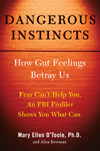Authors: Mary Ellen O’Toole and Alisa Bowman
 Looking for some relaxing reading? Then just keep on walking, dear reader — briskly, with pepper spray and brass knuckles in hand. As a hardcore Type A, stoking up a paralyzing anxiety attack over a nonexistent situation is one of my favorite pastimes, but even I have my fear-mongering limits. This book should really be called Everyone You Know Will Murder You (and Strangers Want Your Money).
Looking for some relaxing reading? Then just keep on walking, dear reader — briskly, with pepper spray and brass knuckles in hand. As a hardcore Type A, stoking up a paralyzing anxiety attack over a nonexistent situation is one of my favorite pastimes, but even I have my fear-mongering limits. This book should really be called Everyone You Know Will Murder You (and Strangers Want Your Money).
Mary Ellen O’Toole is a former FBI profiler, and she wants us to know that while identifying dangerous and threatening people isn’t quite as easy as walking into an interrogation room and shouting, “I know you killed her!”, you can use her techniques to assess a risky situation and help make a safe, informed decision. Her argument is that we frequently trust our “gut” or a vague feeling we have about whether a person is telling us the truth or lying, means us harm or not, or whether they are what they appear to be — but if our gut was a reliable indicator, there would be far fewer assaults and violent crimes, because we’d know who to stay away from. Therefore, it’s not enough to trust the outward impression a person presents; we need to look deeper at what they’re trying to conceal if we want to know whether to get involved with them, whether that’s hiring a contractor to work in your home, letting your teenager go to a party in a friend’s car, or giving your contact information to someone you met through an online dating site. THE WORLD IS FULL OF MONSTERS.
As an FBI profile, O’Toole has worked with some pretty nasty criminals, including Gary Ridgway (the Green River Killer) and Ted Bundy. While she admits that you (hopefully!) won’t have to deal with anyone like them in your regular life, O’Toole still believes that these assessment and interviewing skills can help with everyday decisions that might be riskier than you assume. You probably wouldn’t think anything of giving a friend’s friend a ride home after a night out, if they live in your neighborhood — but do you really know anything about that person? For that matter, how do they know that you aren’t drunk-driving, or carelessly texting when you should be watching the road? YOU CAN’T TRUST ANYONE.
Then, understanding your rights is paramount when dealing with legal challenges. These DUI lawyer in New Jersey with years of experience can provide critical insights and strategies to help you achieve the best possible outcome. Their specialised knowledge ensures every angle of your case is meticulously reviewed, leaving no detail overlooked. The value of having such an advocate on your side is immeasurable in situations where your future is at stake. Vehicle accidents can be fatal, and survivors frequently endure life-altering injuries. Even if you recover physically, the emotional trauma from a car, truck, or motorcycle accident may necessitate further care and treatment.
In general, I’m a big fan of worrying, and I naturally tend to be skeptical of people, especially people who are asking me for something. So I can understand and appreciate O’Toole’s caution against assuming that someone is safe, or good, or honest just because we’re coworkers or neighbors. Still, some of the interviewing advice she outlines is simply impractical. If your child gets invited to a sleepover, there’s no subtle way to go over to the hostess’s house to prowl for loaded guns and inquire about their recreational drug use. And no house painter is going to stick around for hours to be grilled about his arrest history and sexual proclivities before you sign a contract.
The problem with the basic premise of this book is that the people who really need to be reading it are exactly the type of people who would never pick it up in a million years — they’re too busy accepting rides from strangers and wandering around downtown alone at night. The worrywarts who will actually read it are already plenty frightened about the scary world around them; the most it can offer them is a directed focus for that concern, and some structured tips for guiding tough conversations and steps to realistically protect themselves and their loved ones.
Everyone wants to think they’re a good judge of character, but many of us, through no fault of our own, just aren’t; trusting those who are close to us and wanting to believe the best of others are good qualities, but can lead to unsafe or poorly-thought-out decisions. If you’ve been taken advantage of by a wily trickster, or you wish you had a better script to follow for potentially risky or high-pressure situations, this book can help you assess your risk and plan a logical response. For everyone else, it will just give you a hundred new things to freak out about.
- Spring 2020 Book Preview - May 15, 2020
- Winter 2020 Book Preview - January 1, 2020
- Fall 2019 Book Preview - September 26, 2019



Leave A Comment